Chapter 14 - The Lecher

Emperor Pollock I is a… complex man; while it cannot be denied that he is a bureaucrat and administer of great skill, instead of focusing on managing his realm, he instead is content to party, drink, and flirt without regard for what such actions have for his public image.
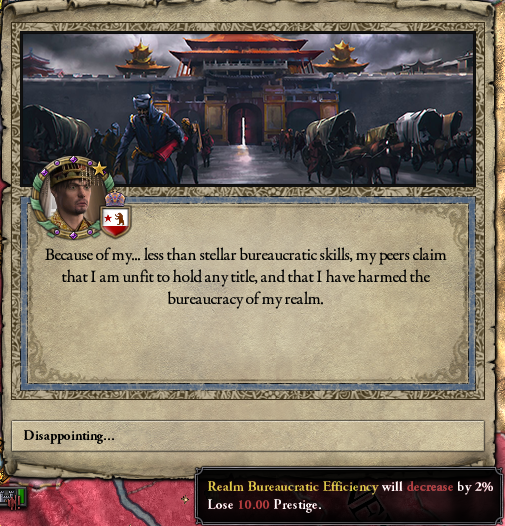

Almost immediately, the empire begins to suffer under his neglect, as he would rather spend his time in the taverns of Sacramento than oversee the Imperial bureaucracy. The lords of California are more than happy to take advantage of his benign neglect and begin to assert more control over their own lands, greatly weakening Imperial authority.
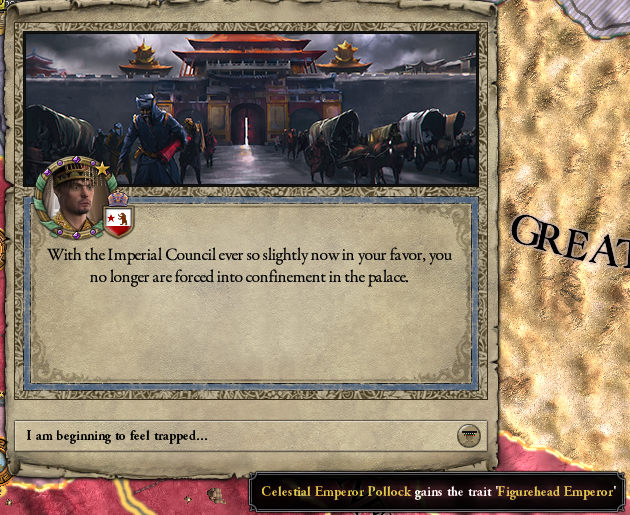

Without a doubt, Emperor Pollock I is emperor in name only; the Imperial Council and the Imperial Bureaucracy fight for dominance within the court, each trying to take advantage of the puppet emperor. In the end, the bureaucrats win out over the long defanged court; while they make sure that the emperor has enough gold for his leisure activities, the bulk of the treasury is focused on the further expansion of the bureaucracy, at the expense of Imperial authority.

With a little prodding, Emperor Pollock I is convinced to see to his Imperial duties; he begins writing a new book, primarily focusing on the art of seduction. Absolutely no one wants him to finish it.

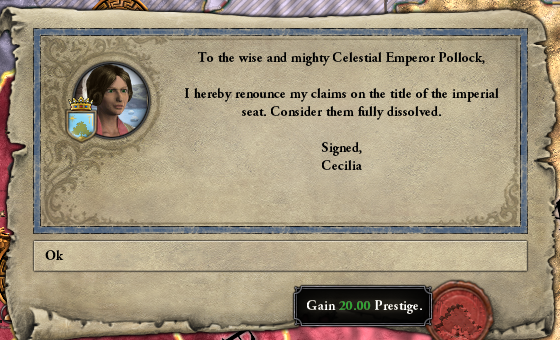
When he’s not drunk and actually focused on a task, Emperor Pollock I can be quite charming; he somehow manages to convince Eleanor Yudkow, the daughter of the late Emperor Reuben II, to renounce her claims on the Imperial Throne, before trying to seduce her.
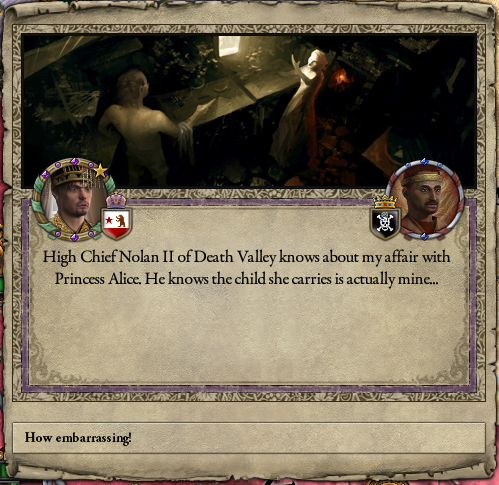
Scandal rocks the Imperial Court in January of 2709: High Chief Nolan II of Death Valley brings credible proof that Emperor Pollock I and his sister, Princess Alice, are in an incestuous relationship, which has resulted in a child. Emperor Pollock I simply walks out of the throne room, instead of responding to the high chief’s claims.

Not too long after, Emperor Pollock I releases a new work; titled The Sweetest Fruit, it makes the bold claim that, actually, incest is good and completely natural. It is certainly one of the more… inspired Imperial texts.
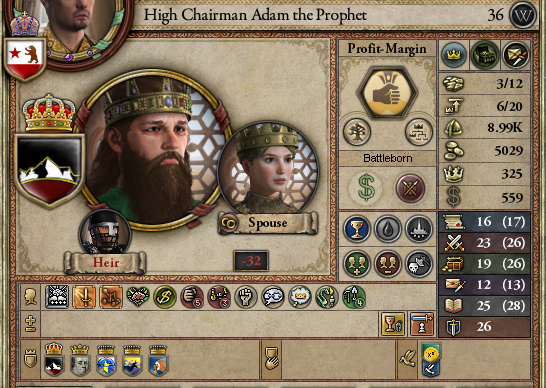

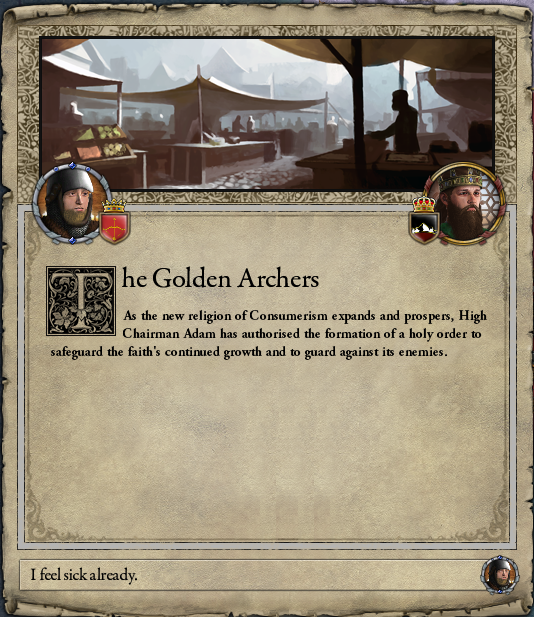
Terrible news arrives from the north: Jefferson, the bulwark against the barbarians of the north, has been bested by the Consumerists, who have now claimed the lands of Idaho, under High Chairman Adam Profit-Margin. The Consumerist kingdom is protected by the deadly Golden Archers, a group of masked archers, covered from head to toe in patchwork golden armor.

The expensive bureaucratic expansion is done; the Imperial council has been filled with bureaucrat aligned aristocrats, as has every level of government.


July brings grim news: Emperor Pollock I’s eldest son, Thao, dies of some unknown illness. The new Imperial heir is Nicholas, a quiet young boy who was never expected to take the throne. The emperor loses himself in the arms of one of his many mistresses, resulting in yet another Imperial bastard.

Emperor Pollock I also manages to make time for his wife, who becomes pregnant in December, marking the emperor’s fourth legitimate child; the emperor’s bastards still out number his legitimate children by a factor of two.

Brasilia is still not a power to be taken lightly, it seems; the Gaúcho emperor brutally puts down a revolt against him by one of his many tributaries. The offender is hung, quartered, and has his head stuck on a pike as an object lesson to any other would be rebels.

While he doesn’t have time govern the Empire, Emperor Pollock I somehow makes time to antagonize his vassals into hating him. One must wonder where how he manages, between his whoring and drinking.
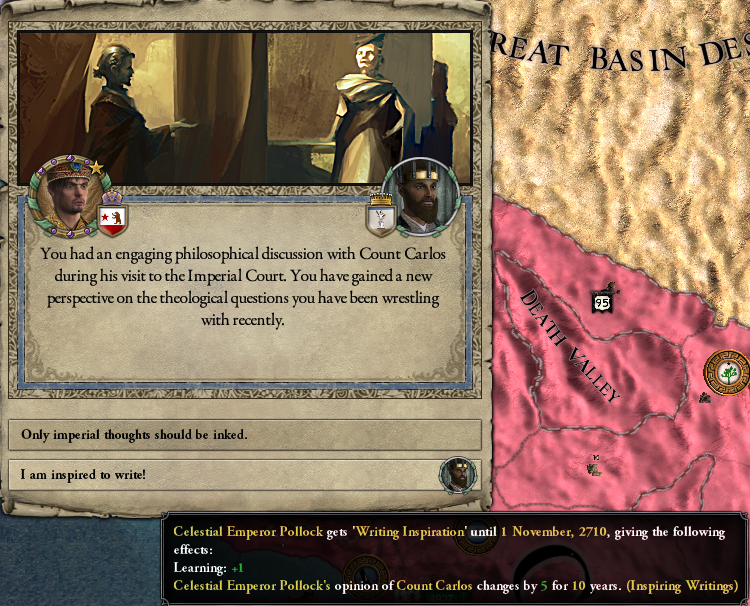
The emperor also off loads most of his actual religious duties on some of his drinking friends; during his reign, most of the Imperial texts published are actually written by someone other than the emperor. The biggest sign that they were not penned by Emperor Pollock I is that they actually have some religious and academic value.
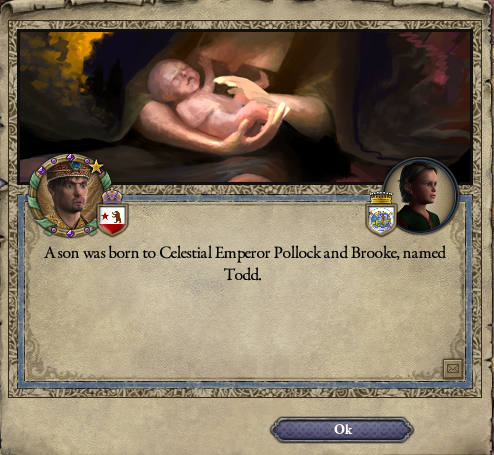

Emperor Pollock I spends most of 2710 in a drunken stupor, only coming out of it long enough to acknowledge his latest bastard, a boy named Todd.
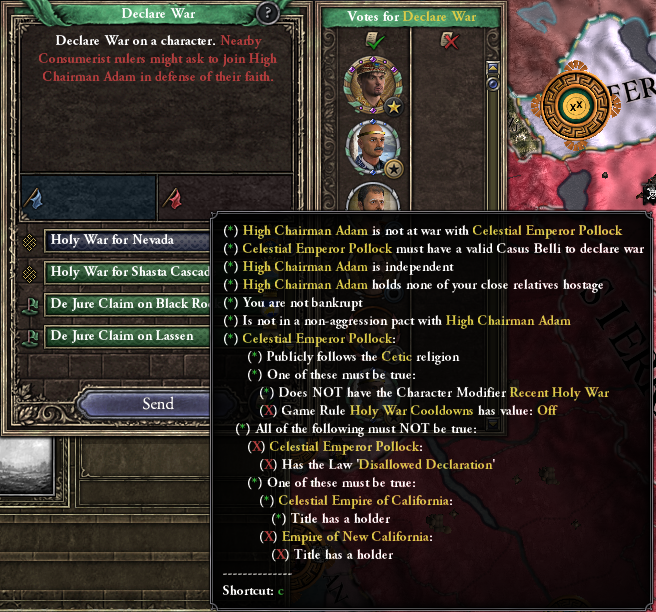
In April of 2711, the Imperial bureaucracy manages to get the emperor to sign off on a holy war to retake Nevada from the Consumerists; pressure from the aristocracy and the peasants over the loss of half of Jefferson to a group of heretics threatens to topple the bureaucracy in a palace coup, and the hope is the holy war will give the two groups something new to focus on, as well as renew faith in the emperor.



Instead of focusing on the Nevadan Reclamation, Emperor Pollock I gets really into hosting feast after feast after feast. The end result is that he throws out most of his old clothing and demands the bureaucrats buy him a new wardrobe that fits, as well as a new Imperial work, titled Food for Thought. It is not exactly a mentally stimulating book.
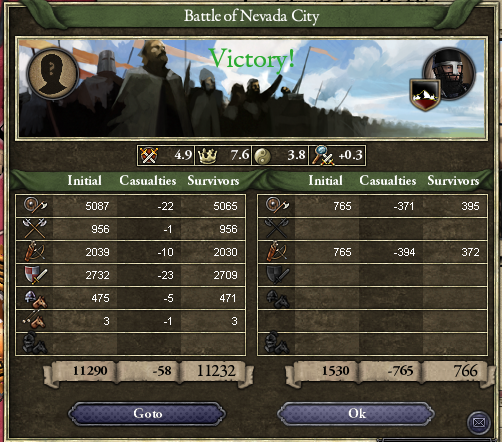

The Nevadan Reclamation starts off well, with the Imperial Army beating the Consumerists at Nevada City; they even manage to capture one of the Golden Archer’s captains.

Things take a turn in 2712 at the Battle of Grass Valley, where the Imperial Army faces off against the main Consumerists army, lead by High Chairman Adam himself. For the first time in decades, the Imperial Army is forced to retreat.

The emperor is inspired by the Imperial defeat at Grass Valley, and pens the work known as The Dishonor of Retreat; little more than a denunciation of the generals who had lost Grass Valley, it is a detailed report of what the emperor would’ve done, had be been consulted. A great number of Imperial generals threaten to leave their posts, and the Imperial bureaucracy taps into the treasury to bribe them into compliance.


Meanwhile, in the Mid-East, the Norse of the Twin Cities, led by Jarl Ollrod, have come together to codify their faith, in an effort to compete with the Christian kingdoms of Iowa and Chicagoland. Along with this new hierarchy comes the creation of the Fylkir’s Hundred, a band of elite warriors tasked with defending the reformed Norse faith from Minnesota to Ohio.

The Imperial Army suffers a second defeat, this time at Placerville. Disheartened by the emperor’s poor leadership, many Imperials simply desert rather than fight for the Lecher Emperor.
With the rise of heathen powers to the east, as well at home, and a weak, lecherous emperor on the throne, it seems as if California’s star is once again in decent. The dream of a unified, strong California seems more and more distant every day.